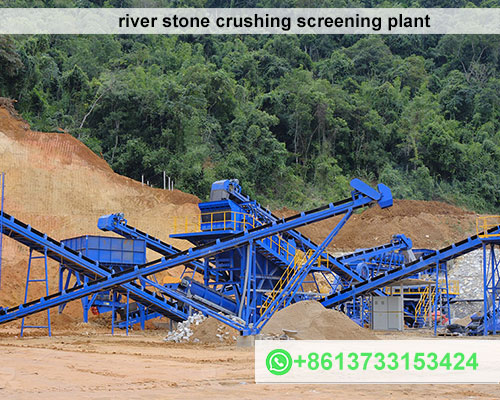River Stone Crushing Screening Plant
A river stone crushing and screening plant is a facility that processes river stones into various aggregate sizes for use in construction materials. These plants are essential for producing high-quality construction aggregates, which are used in a wide variety of applications, including:
- Road construction: Crushed river stones are used as the primary aggregate in asphalt and concrete pavements.
- Building construction: Crushed river stones are used in concrete foundations, walls, and floors.
- Landscaping: Crushed river stones are used as decorative gravel and mulch.
- Drainage: Crushed river stones are used in drainage systems to prevent water from pooling and causing erosion.
The Crushing and Screening Process

The river stone crushing and screening process typically involves the following steps:
- Feeding: River stones are fed into the plant by a hopper or conveyor belt.
- Primary crushing: The stones are first crushed by a primary crusher, such as a jaw crusher or gyratory crusher, to reduce them to a manageable size.
- Secondary crushing: The partially crushed stones are then fed into a secondary crusher, such as a cone crusher or impact crusher, to further reduce their size.
- Screening: The crushed stones are then screened by a series of vibrating screens to separate them into different aggregate sizes.
- Stockpiling: The screened aggregates are stockpiled in separate bins for storage and transport.
Types of River Stone Crushing and Screening Plants
There are two main types of river stone crushing and screening plants:
- Stationary plants: Stationary plants are permanent facilities that are typically located near the source of the river stones. They are designed to handle large volumes of material and can produce a wide variety of aggregate sizes.
- Mobile plants: Mobile plants are portable facilities that can be easily transported to different locations. They are typically used for smaller projects or for projects in remote areas.
Factors to Consider When Choosing a River Stone Crushing and Screening Plant
When choosing a river stone crushing and screening plant, it is important to consider the following factors:
- Capacity: The capacity of the plant will depend on the volume of material that needs to be processed.
- Aggregate sizes: The plant should be able to produce the aggregate sizes that are required for the project.
- Portability: If the plant needs to be moved from one location to another, a mobile plant may be the best option.
- Environmental regulations: The plant must comply with all applicable environmental regulations.
Benefits of Using a River Stone Crushing and Screening Plant
There are many benefits to using a river stone crushing and screening plant, including:
- High-quality aggregates: River stone aggregates are known for their durability and strength.
- Reduced waste: The crushing and screening process can help to reduce the amount of waste that is generated from construction projects.
- Environmental benefits: River stone aggregates are a natural resource that can be reused and recycled.
- Cost savings: Using a river stone crushing and screening plant can save money on the cost of construction materials.
Overall, river stone crushing and screening plants are essential for the production of high-quality construction aggregates. By using these plants, contractors can save money, reduce waste, and protect the environment.









